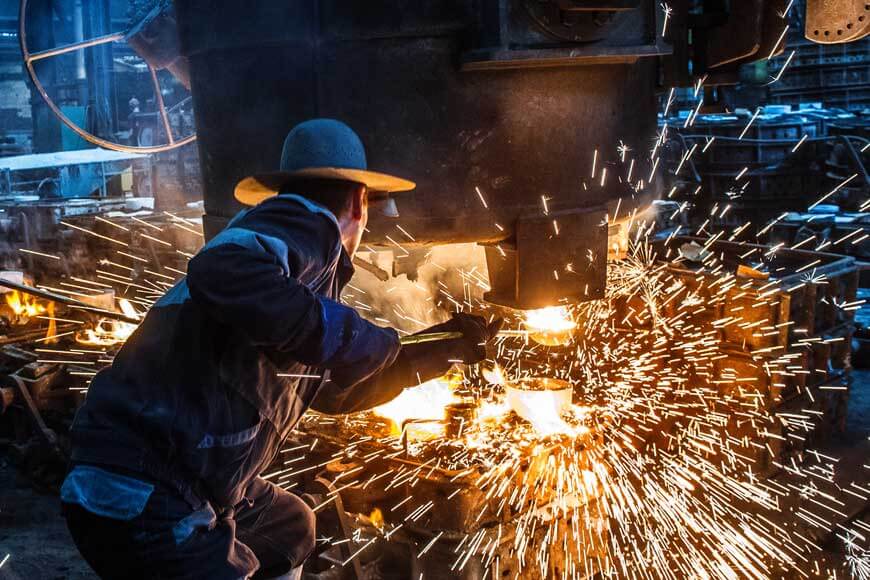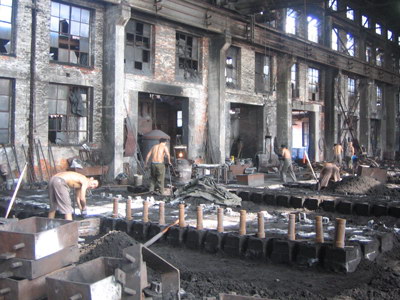Detailed overview of how an Aluminum Foundry melts, molds, and casts metal parts
Wiki Article
Exactly How a Metal Foundry Contributes to Lasting Metal Production Practices
Metal foundries play a crucial duty in advertising sustainability within the metal production industry. By integrating recycled products, they minimize dependence on virgin resources and minimize environmental effects. Energy-efficient melting procedures better minimize power usage and exhausts. The journey towards lasting techniques involves more than just reusing and power monitoring. It incorporates a broader dedication to honest sourcing and ingenious technologies. The implications of these techniques are considerable and warrant better examination.The Duty of Recycling in Metal Foundries
While metal manufacturing has traditionally relied upon virgin products, the enhancing emphasis on sustainability has brought about a substantial shift in methods, especially in metal foundries. Recycling has actually arised as an essential element of this change, enabling foundries to repurpose scrap metal and lower reliance on mined sources. By incorporating recycled products into their processes, foundries not just decrease environmental effect yet also lower manufacturing expenses.Making use of recycled metals, such as steel, copper, and aluminum, decreases power consumption and lowers greenhouse gas discharges connected with traditional mining and refining techniques. In addition, foundries can achieve top notch outputs by employing advanced sorting and handling modern technologies to ensure the purity of recycled materials. This emphasis on recycling fosters a circular economic climate, where waste is reduced, and resources are used effectively. Subsequently, metal foundries play a crucial role in advertising sustainable practices within the metal manufacturing industry.
Energy-Efficient Melting Strategies
Energy-efficient melting strategies are important for improving sustainability in metal production. These strategies considerably decrease energy usage during the melting process, which is among one of the most energy-intensive stages in metal manufacturing. Technologies such as induction melting, resistance home heating, and microwave melting offer boosted performance contrasted to typical methods. Induction melting, for example, utilizes electromagnetic areas to create warmth directly within the metal, lessening power loss and supplying specific temperature control.Additionally, implementing heat recovery systems can even more improve performance by recycling and catching waste warmth created throughout melting. Using innovative insulation materials and optimizing furnace styles additionally add to energy savings. By embracing these innovative melting techniques, metal foundries can lower their carbon footprint, minimize functional costs, and add to an extra lasting manufacturing landscape. The combination of energy-efficient techniques not just straightens with environmental goals but additionally meets the growing demand for responsible production techniques in the metal industry.
Lasting Sourcing of Raw Products
Lasting sourcing of basic materials is important for decreasing the environmental effect of metal manufacturing. This entails the increased usage of recycled metals, the adoption of moral mining practices, and efforts aimed at local sourcing. By prioritizing these methods, the sector can promote accountable resource management and assistance local economic situations.
Recycled Metal Use
Exactly how can markets efficiently minimize their ecological influence while fulfilling the growing demand for metal? One considerable method is the utilization of recycled metal. By incorporating scrap metal into their production procedures, foundries can reduce the extraction of virgin materials, consequently minimizing and conserving all-natural sources energy intake. Recycled steels call for less energy to process contrasted to their raw equivalents, causing reduced greenhouse gas exhausts. Additionally, using recycled metal helps draw away waste from landfills, promoting a circular economy. Industries that prioritize recycled metal not just add to sustainability yet additionally gain from cost financial savings connected with minimized product procurement. Consequently, recycled metal usage stands as an important approach for ecologically responsible metal manufacturing.Moral Mining Practices
While the need for steels remains to climb, industries are increasingly recognizing the value of honest mining practices in making certain liable sourcing of raw materials. Honest mining includes a dedication to environmental stewardship, social duty, and adherence to fair labor techniques. Firms are now prioritizing collaborations with mines that demonstrate openness in their operations, decreasing ecological impact and valuing neighborhood communities. This technique not only cultivates a sustainable supply chain however also improves the track record of organizations entailed. By executing strenuous criteria and accreditations, sectors can deal with unlawful mining activities and promote the well-being of workers. Inevitably, honest mining techniques contribute markedly to an extra lasting metal production ecosystem, aligning financial development with social and ecological honesty.Local Sourcing Efforts

Innovations in Metal Casting Procedures
Advancements in metal casting processes are transforming the market by integrating sophisticated recycling methods that reduce waste. Energy-efficient melting methods are likewise being developed to reduce power usage during production. In addition, using cutting-edge mold materials adds to boosted performance and sustainability in casting procedures.Advanced Recycling Techniques
Advanced recycling strategies are transforming metal casting procedures, greatly enhancing sustainability in the sector. These advancements concentrate on reprocessing and redeeming scrap metal, substantially lowering waste and the need for virgin materials. Techniques such as hydrometallurgy and pyrometallurgy enable foundries to extract beneficial metals from used elements, making sure efficient resource use. Additionally, progressed sorting and purification innovations enhance the quality of recycled metals, making them suitable for high-performance applications. This not just reduces the environmental footprint of metal production however likewise fosters a round economic climate by advertising the reuse of materials. As these recycling approaches remain to evolve, they promise to better improve procedures within foundries and add to a much more lasting metal manufacturing landscape.Energy-Efficient Melting Methods
While traditional melting methods have actually long been the backbone of metal casting, current advancements have actually introduced energy-efficient techniques that markedly decrease energy consumption and exhausts. Technologies such as induction melting and electrical arc furnaces have gained prestige, enabling exact control over temperature level and reducing the need for fossil fuels. These approaches not only boost energy effectiveness but also advertise quicker melting times, which translates to lower operational costs. Additionally, advancements in warmth recovery systems enable foundries to catch and recycle excess heat created during the melting procedure. This holistic technique to energy monitoring not just sustains sustainable methods yet likewise placements metal foundries as leaders in the shift towards greener production procedures, additionally aligning with international sustainability objectives.Ingenious Mold Products
As the need for even more lasting and efficient metal casting processes grows, the exploration of ingenious mold products has ended up being a focal factor in the market. Traditional mold materials frequently add to environmental obstacles, triggering the look for alternatives that lower waste and power usage. Recent improvements include the development of naturally degradable binders and recyclable compounds, which not only boost mold and mildew efficiency yet also minimize eco-friendly influence. Additionally, the usage of 3D printing modern technology in mold and mildew creation permits intricate designs that minimize product use and enable fast prototyping. These innovative products not only enhance casting accuracy however likewise align with sustainability goals, showcasing the sector's dedication to decreasing its carbon impact while preserving premium manufacturing requirements.Lowering Waste With Advanced Modern Technology
Innovative modern technologies are changing the metal manufacturing sector by substantially decreasing waste and enhancing performance. Advanced data analytics and artificial intelligence algorithms enable foundries to optimize manufacturing processes, minimizing and recognizing ineffectiveness scrap material. Smart sensors monitor tools efficiency in real-time, enabling for predictive upkeep that minimizes downtime and waste generation. In addition, additive manufacturing techniques, such as 3D printing, enable the development of complex elements with minimal material use, markedly decreasing waste compared to traditional methods.
Moreover, closed-loop systems are becoming extra common, wherein scrap metal and results are recycled back right into the production cycle, guaranteeing that products are made use of to their max possibility - Aluminum Foundry. This integration of modern technology not just promotes resource preservation however additionally enhances the overall sustainability of metal manufacturing techniques. By embracing these innovations, foundries can contribute to an extra sustainable future while preserving competitiveness on the market
The Influence of Foundries on Carbon Footprint Decrease
Foundries play a vital function in reducing the carbon footprint of the metal production industry by executing various lasting methods. By using energy-efficient modern technologies, such as electric arc furnaces, these centers substantially lower greenhouse gas emissions contrasted to typical approaches. Furthermore, foundries progressively embrace sustainable power sources, which likewise diminishes their dependence on nonrenewable fuel sources.Reusing scrap metal is one more essential technique that foundries use, saving resources and decreasing the need for virgin products. This not only decreases waste however additionally lowers the energy-intensive extraction processes connected with mining. The adoption of closed-loop water systems aids to minimize water usage and reduce wastewater discharge, contributing to a more lasting procedure.
Via these initiatives, foundries demonstrate their dedication to ecological stewardship, causing a significant decrease in the total carbon footprint of the metal production field. Their recurring initiatives are critical in the change towards a more lasting commercial landscape.
Often Asked Concerns
What Types of Metals Are Many Typically Recycled in Foundries?
Aluminum, copper, steel, and brass are among one of the most frequently recycled useful site steels in foundries. These steels are preferred as a result of their high recycling prices, financial worth, and prevalent accessibility, adding substantially to industrial sustainability efforts.Exactly How Do Foundries Guarantee the Quality of Recycled Materials?
Foundries establish the top quality of recycled products via extensive testing, great site sorting, and purification processes. They apply innovative innovations to examine structure and eliminate pollutants, ensuring that the recycled metals meet market criteria for performance and safety.
What Qualifications Exist for Lasting Foundry Practices?
Numerous accreditations exist for lasting foundry techniques, including ISO 14001 for ecological monitoring, ISO 50001 for power management, and LEED accreditation for sustainable building methods (Aluminum Casting). These certifications help guarantee adherence to ecological and sustainability criteria in proceduresExactly How Do Foundries Measure Their Carbon Footprint Reduction?
Foundries determine carbon impact decrease through tools like lifecycle assessments, power audits, and discharges tracking systems. They contrast standard emissions to current outcomes, reviewing improvements in power efficiency, product use, and renewable resource fostering gradually.What Are the Economic Benefits of Lasting Metal Production?
Lasting metal manufacturing provides economic advantages such as reduced operational expenses, enhanced efficiency, boosted market competitiveness, and possible government motivations. Additionally, it promotes technology and draws in environmentally conscious consumers, inevitably driving long-term success for companies.Metal foundries play a vital duty in advertising sustainability within the metal manufacturing market. While metal manufacturing has typically counted on virgin products, the enhancing emphasis on sustainability has led to a substantial change in methods, especially in metal foundries. By incorporating scrap metal into their manufacturing procedures, foundries can lower the removal of virgin materials, thus lowering and preserving natural resources energy usage. Foundries play an essential function in reducing the carbon impact of the metal production sector by applying numerous lasting practices. Reusing scrap metal is an additional essential technique that foundries employ, conserving sources and minimizing the need for virgin materials.
Report this wiki page